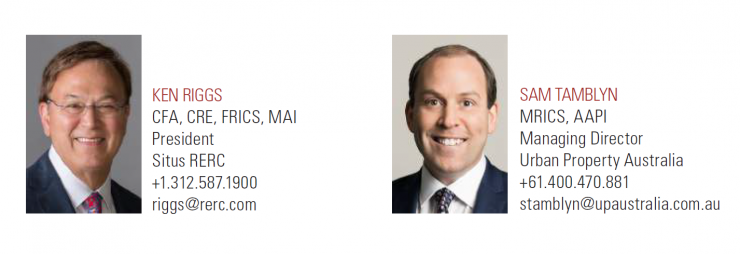Executive Summary
April 14th 2018 | , Urban Property Australia
For the third straight year, Australia is the third highest ranked country for commercial real estate investment in the Asia Pacific, according to data from Real Capital Analytics (RCA). Australia is ranked seventh in transaction volume globally, behind the US, Germany, the UK, France, China and Japan.
Australia joins the US, UK and Germany as the only countries with multiple cities in the top 25 for global capital cross-border flow in 2017, and total commercial real estate investment into Australia surpasses many global economies, including Hong Kong, Singapore, Canada, Spain and the Netherlands.
The relatively high rankings for Australia are in spite of a 10% decline in total year-over-year (YoY) transaction volume. For context, only four of the top 14 nations in terms of transaction volume experienced negative YoY growth, according to RCA: the US, Mexico, China and Australia.
Australia also witnessed a 15% YoY decrease in cross-border capital in 2017; however, the percentage of total volume attributed to cross-border capital (46%) represented a smaller piece of the pie – down from 51% in 2016. Of the total capital flows into Australia, Singapore, China and the US led the pack for single countries, with each investing over US$2 billion[1]. Singapore, Malaysia, South Korea and Hong Kong all increased their investment into Australia in 2017 compared to 2016.
After six consecutive years of cross-border investment into Australia surpassing $10 billion annually, it appears that some offshore investors have started to recycle capital placed in Australian assets, realising strong capital growth.
Chinese cross-border investment declined 53%, but it was still a net buyer of Australian commercial real estate.
This decline occurred after the Chinese government tightened its rules on foreign investment. It’s a fair assessment that the fall in investment volume probably more reflects the capital constraints from China rather than diminishing appetite.
Regardless of the reason, Chinese investment accounted for 14% of total cross-border investment in Australian commercial real estate in 2017, its lowest share since 2013.
Reflecting Australia’s strong economic and property investment performance, the bulk (44%) of respondents of the 1Q 2018 Situs RERC/UPA Australian Market Expectations survey indicated that it was a good time to hold Australian commercial real estate, up from 42% in the 1Q 2017 Australian Market Expectations survey.
Fierce competition for assets in Sydney and Melbourne have led to exceptionally high prices and an increase in the recommendation to sell in these cities.
In Sydney, 50% of respondents said that the next quarter would be a good time to sell commercial real estate and 41% of Melbourne respondents said that the next quarter would be a good time to sell. Yet, according to RCA data, only three countries are net sellers in the Australian real estate market – Malaysia, Canada and the US.
In this edition of the Situs RERC/UPA Australian Real Estate Trends report, we explore Australian and global economies and real estate investment activity. We also present the results of our Australian investor sentiment survey and provide a deep analysis of Australian capital cities. In a time of considerable turmoil and uncertainty around the world, the Australian economy – and its commercial real estate market – appear to be generally holding firm. As seen in this report, some property sectors and markets are faring better than others, but a generally rosy outlook for the Australian economy should buoy the real estate market in 2018.
[1] Unless otherwise noted, currencies are listed in US dollars.
Special Recognition
The sponsoring firms (Situs RERC & Urban Property Australia) would like to express their deep gratitude for Real Capital Analytics (RCA) for providing transaction volume and capital flow data during the completion of this report. All investment activity data comes from data provided by RCA. For more information about RCA’s data services, visit www.rcanalytics.com.




